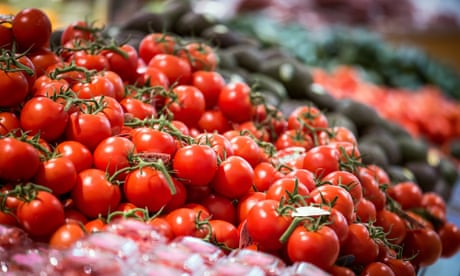- by foxnews
- 23 May 2025
‘Out of control’ gas prices likely to filter down to Australian consumers, food processor says
‘Out of control’ gas prices likely to filter down to Australian consumers, food processor says
- by theguardian
- 04 Jun 2022
- in news

One of Australia's largest regional food processors says energy costs are "out of control", with already elevated gas prices tripling since the company signed new contracts in early 2022.
Consumers will inevitably cop higher prices on their products with other costs also on the rise, including a jump of as much as 40% for raw materials such as tomatoes, carrots and apples in the past year, Jason Fritsch, the chief executive of Kagome, said.
Kogame produces about 200,000 tonnes of tomatoes, 30,000 tonnes of carrots, 10,000 tonnes of apples and 7,000 tonnes of beetroot annually.
The firm's gas bill will rise 25% next year to $4.4m, but the expenses would have been much higher again if it attempted to sign for the same gas now.
"We'd be paying somewhere between $6m and $8m more," Fritsch said. "It would be a case of 'shut your doors' - you'd be making a loss. It's crazy how much gas has gone up in the past three or four months."
Kagome - based in Ecucha, Victoria and employing about 300 people - has also seen its electricity bill rise, but less steeply. The company expects to pay $1.7m this year and as much as $2m next year.
"This is very common across the processing and manufacturing industries in Australia, particularly in regional Victoria," Fritsch said. Without intervention by governments to lower energy costs, companies would have little choice but to pass on the higher costs if they are to remain in business, adding to cost of living pressures.
Energy prices have emerged as the first major domestic issue facing the new Albanese government, with energy retailers exiting the market and regulators having to intervene to ensure sufficient gas supplies during the first big cold snap of winter.
So far the government has not ruled out some form of reservation of gas production for local use in eastern Australia, although the gas industry has argued such a move would reduce investment and ultimately production.
But pressure could mount, particularly if a major gas consumer were to fail to secure supplies or shut operations because of higher prices. Last month, Weston Energy, an independent gas retailer, exited the market abruptly because of soaring prices. At least one big customer is understood to have failed to find a new supplier.
Fritsch said reserving 15% of the gas has worked to keep prices in check in Western Australia, and such a plan should be considered for the east as well. He led a delegation of producers to meet the then energy minister Josh Frydenberg in 2016 in a bid to lower energy costs, an approach Fritsch plans to repeat in coming months.
"The one thing that processors and manufacturers have always had access to was a plentiful supply of competitively priced energy," he said. "We're at a point now where if your costs continue to climb, it makes it very difficult to continue to operate."
Data from consultants EnergyQuest shows that gas use in the power sector was one of the big changes in May in the national electricity market that serves eastern states.
Its share of the market increased by about half from a year earlier to 9.2%. Total output from coal-fired power plants fell 7.8% because of a big increase in outages during the month.
Renewable energy also helped pick up some of the slack, though cloudier conditions in Queensland cut solar output in that state.Wind energy rose 9% from a year earlier and output from large-scale and rooftop solar rose 5.2%. Extra rain in recent years has also come in handy, with generation from hydro plants, mostly in the Snowy mountains, up 27.4%, EnergyQuest said.
The Australian Energy Market Operator will be watching for further strains on supplies when another cold front sweeps across southern Australia early next week, potentially raising demand, particularly for gas in Victoria once more.
Gas price caps, introduced by Aemo in NSW following Weston's exit from the market, that limit prices to $40 per gigajoule are also scheduled to end on 7 June.
Fritsch said Kagome used to pay $4.50 to $5 a gigajoule, before eastern Australia's gas market was linked to global markets that have lately seen prices rocket after Russia's invasion of Ukraine. Now the spot price was $30 a GJ or more.
"Our concern is what's going to happen in 2024, 25 and 26," he said.
- by foxnews
- descember 09, 2016
United Airlines flight returns to Hawaii after concerning message found on bathroom mirror; FBI investigating
United Airlines Flight 1169 to Los Angeles returned to Hawaii after a "potential security concern" aboard the plane. The FBI and police are investigating.
read more


